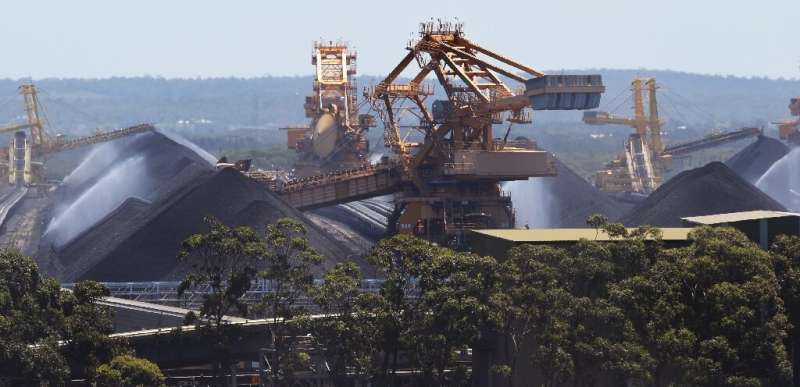Prime Minister Scott Morrison said Australia's energy resources exports were needed to power developing countries.
Australia vowed Thursday to keep mining coal for export and said global demand was rising, rejecting a study that warned nearly all its reserves must stay in the ground to address the climate crisis.
Researchers warned in a study published in the journal Nature this week that 89 percent of global coal reserves—and 95 percent of Australia's share—must be left untouched.
Such restraint, they said, would still only offer a 50 percent chance of limiting warming to 1.5 degrees Celsius above pre-industrial levels—the current global goal.
But Prime Minister Scott Morrison said Thursday Australia's energy exports were needed to power developing countries, and predicted technology would enable them to be burned "in a much more climate-friendly way" in the future.
"We will keep mining the resources that we're able to sell on the world market," Morrison told a news conference when asked if he would put an "expiration date" on the coal mining industry.
"We obviously anticipate that over time world demand for these things may change."
Under existing agreements, developing countries are able to use Australian resources "well into the future", Morrison said.
Negotiators from 196 countries will join the 26th edition of the UN Climate Change Conference of the Parties—COP26—in the Scottish city of Glasgow in November.
The 12-day meeting, the biggest climate conference since landmark talks in Paris in 2015, is seen as a crucial step in setting worldwide emissions targets to slow global warming.
Climate scientists warn extreme weather and fierce fires will become increasingly common due to manmade global warming.
Environmentalists argue inaction on climate change could cost Australia's economy billions of dollars as the country suffers more intense bushfires, storms and floods.
But Canberra has refused to adopt a net-zero emissions target and remains one of the world's largest fossil fuel exporters.
Australian Resources Minister Keith Pitt said coal remained Australia's second-largest export, after iron ore.
Coal exports brought in Aus$50 billion (US$37 billion) a year and the industry provided direct jobs for 50,000 Australians, he said.
"The reality is that global demand for Australian coal is increasing and forecast to continue rising into the next decade at least," Pitt said in a statement, promising coal industry workers they had a "long-term commitment" from the government.
Journal information: Nature
© 2021 AFP
























